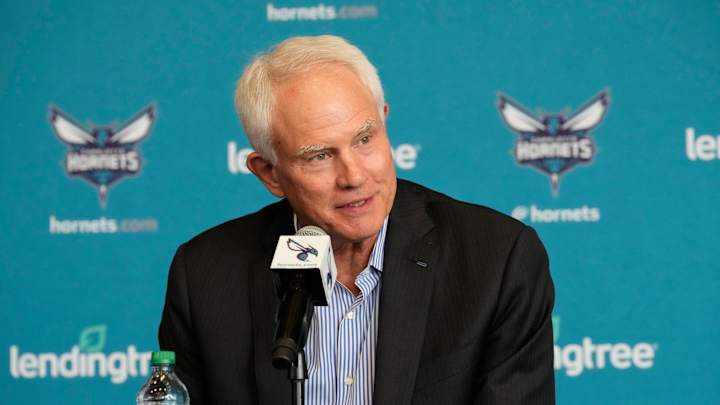Why The Charlotte Hornets Should Spend All Their Picks

In this story:
For any team, taking on five rookies for a new season might seem like an extreme undertaking. Practices will have to be tailored to player development instead of refinement, and the expectation of becoming a winning team - at least immediately - is out the window.
Yet, for the Charlotte Hornets, who does indeed possess five picks in the 2023 NBA draft, making all those selections might be their best path forward.
The team is not only one of the worst in the league, but you could make a reasonable argument that the Hornets roster is the least talented group of players in the NBA. Outside of LaMelo Ball, who is obviously one of the most exciting young talents in the league, it's fairly slim pickings.
Granted, the Miles Bridges situation in large part put them in that situation. Losing a young 20-point two-way player, without getting anything in return, will always hurt the overall talent level.
There's also the uncertainty of PJ Washington going forward. A restricted free agent, the Hornets hold the right to match any offer, but major offers to either could end up seeing him playing elsewhere next season.
As such, the Hornets need to enter the draft prepared to spend all of their picks, and embrace a youth movement which at this point seems necessary.
Four of the five picks are already locked in. Those are No. 27, No. 34, No. 39, and No. 41. They also are projected to pick in the Top 5, currently slotted to select fourth, but the lottery could change their final spot.
Having five selections roughly in the Top 40 is a tremendous position to be in. This draft is viewed as a particularly strong class, both in terms of the top-end talent, but also through the lens of depth. There are players to be found in the later stages of the first round, and early in the second, that could very well make a roster, and become rotation players down the line.
So, what should be the approach of the Hornets, going into the draft? Two things spring to mind immediately. Youth and production.
Too often have the Hornets opted for older players from established programs, who haven't necessarily been more than complementary contributors.
The aforementioned Washington in Kentucky was a stable forward, but at no point did his play or production indicate star upside. Malik Monk, also a product of Kentucky, had the upside, but the organization utterly failed at giving their lottery pick a chance to shine, starting him in one game over his four-year tenure there.
The team, infamously, also spent two Top 10 picks on Cody Zeller and Frank Kaminsky in 2013 and 2015 respectively, despite the fact that both had questions about their overall upside.
It's time for the Hornets to operate more as they did in 2020, when no one really knew what to make of Ball, and they decided to swing for the fences anyway. They actively bought in on upside, ignoring their own tradition of sticking with well-known college programs, and instead take a kid who had last played in Australia, and had spent the past few years playing in obscure places around Europe, showing off his dad's shoeline.
That type of out-of-the-box thinking can be a godsend, as long as you embrace the risk factor, and understand it might not work out.
For what it's worth, there isn't a fan base alive that wouldn't support a team going all-in on players with star upside. The most deflating approach will always be the conservative one, where you find yourself in the late lottery, year after year, selecting established role players.
This year, the Hornets should practically make rules in regards to their process.
- No player over the age of 20, unless his production is through the roof, and there's a clear path towards emulating such production at the pro level.
- No player with wonky shooting mechanics, since the way to build around Ball is putting players around him who can consistently space the floor.
- Positional fluidity is a must, and any player without the ability to defend at least two positions should not be considered.
- Aggressiveness is a skill, and any player who doesn't back down from a challenge is moved up the board.
And, of course, it needs to be said that making five picks needn't mean all five be on the roster next season. Going the route of picking international players, and using a year to stash them overseas is a perfectly sound strategy.
More than anything, this is about a change in culture, and a change in approach. The Hornets must begin to create their own luck, and they do so by looking several years ahead, instead of just into next season.
Armed with five picks within the first 41 selections is a great way to do just that.
Unless noted otherwise, all stats via NBA.com, PBPStats, Cleaning the Glass or Basketball-Reference. All salary information via Spotrac. All odds courtesy of FanDuel Sportsbook.
Want to join the discussion? Like Draft Digest on Facebook and follow us on Twitter to stay up to date on all the latest NBA Draft news. You can also meet the team behind the coverage.

Morten has managed to create a stable career for himself, launching Denmark's first weekly NBA radio show, and co-hosting a weekly NBA TV show. He's a seasoned basketball analyst and is experienced covering the league and its upcoming prospects.
Follow msjnba